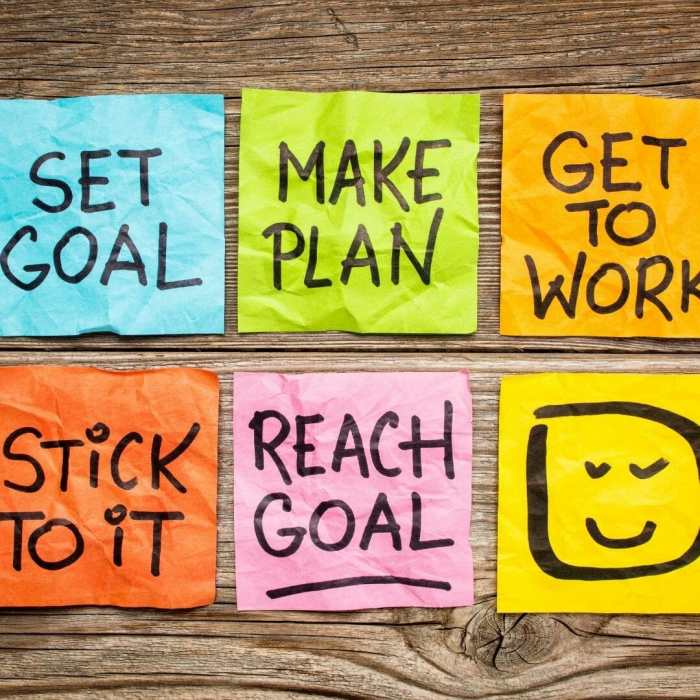Health and Fitness Goals take center stage in the quest for a better lifestyle, offering a roadmap to a healthier you. Let’s dive into the realm of setting and achieving these crucial goals.
From weight loss to muscle gain, flexibility to endurance, the journey towards optimal health is paved with goals worth achieving.
Importance of Health and Fitness Goals

Setting health and fitness goals is crucial for overall well-being as it provides a clear direction and purpose to your wellness journey. By establishing specific goals, you can track your progress, stay motivated, and maintain focus on achieving a healthier lifestyle.
Motivation and Focus
- Having clear health and fitness goals helps in keeping you motivated to make positive lifestyle changes. When you have a target to work towards, you are more likely to stay dedicated and committed to your exercise routine and dietary choices.
- Goals act as a guiding light, ensuring that you stay focused on the actions needed to reach your desired level of health and fitness. They serve as a reminder of why you started your journey in the first place and keep you accountable for your actions.
Short and Long Term Benefits
- Achieving health and fitness goals in the short term can lead to immediate benefits such as increased energy levels, improved mood, better sleep quality, and enhanced physical performance.
- In the long term, reaching your health and fitness goals can reduce the risk of chronic diseases, boost your overall quality of life, increase longevity, and promote a sense of accomplishment and satisfaction.
Types of Health and Fitness Goals
To achieve success in health and fitness, it’s essential to set specific and measurable goals. Different categories of health and fitness goals include weight loss, muscle gain, flexibility, endurance, and overall physical well-being. Each category requires a unique approach to training and nutrition to achieve optimal results.
Weight Loss Goals
Weight loss goals focus on reducing body weight by burning excess fat through a combination of calorie deficit and increased physical activity. Setting a specific target weight to reach and tracking progress through regular weigh-ins can help individuals stay motivated and on track.
Muscle Gain Goals
Muscle gain goals involve increasing muscle mass through resistance training and proper nutrition. Setting specific strength and muscle size targets, along with tracking progress through measurements and strength gains, can help individuals gauge their progress effectively.
Flexibility Goals
Flexibility goals aim to improve range of motion and reduce the risk of injuries by incorporating stretching and mobility exercises into a fitness routine. Setting specific flexibility benchmarks, such as touching toes or performing a split, can help individuals track their improvements over time.
Endurance Goals
Endurance goals focus on improving cardiovascular fitness and stamina through activities like running, cycling, or swimming. Setting measurable targets such as completing a certain distance or reducing workout times can help individuals monitor their progress and push themselves to new levels of endurance.
Setting realistic and achievable health and fitness goals is crucial to avoid frustration and demotivation. By breaking down larger goals into smaller, manageable milestones and celebrating each achievement along the way, individuals can maintain momentum and stay committed to their fitness journey.
Strategies for Setting Health and Fitness Goals
Setting health and fitness goals is essential for progress and success in your wellness journey. Here are some strategies to help you set effective goals:
SMART Goals
When setting health and fitness goals, it’s important to follow the SMART criteria:
- Specific: Clearly define what you want to achieve in terms of health and fitness.
- Measurable: Set goals that can be tracked and measured to monitor progress.
- Achievable: Ensure that your goals are realistic and attainable within your capabilities.
- Relevant: Make sure your goals align with your overall health and fitness aspirations.
- Time-bound: Set a deadline for achieving your goals to create a sense of urgency.
Detailed Plan with Milestones
Creating a detailed plan with milestones is crucial for reaching your ultimate health and fitness goal. Breaking down your goal into smaller, achievable milestones helps you stay motivated and on track.
Short-term and Long-term Goals
Short-term goals provide you with quick wins and keep you motivated along the way. For example, aiming to exercise three times a week or drink more water daily can be short-term goals. On the other hand, long-term goals, such as running a marathon or losing a certain amount of weight over several months, contribute to your overall success in the long run.
Tracking Progress and Adjusting Goals

Tracking your progress and adjusting your health and fitness goals are crucial steps in achieving success on your journey to a healthier lifestyle. By keeping track of your progress, you can stay motivated, identify areas for improvement, and make necessary adjustments to your goals.
Methods for Monitoring Health and Fitness Goals
- Journaling: Keeping a daily log of your workouts, meals, and how you feel can help you see patterns and track your progress over time.
- Using Apps: There are numerous fitness and health apps available that can help you track your exercise, food intake, and overall progress.
- Seeking Professional Help: Consulting with a personal trainer, nutritionist, or healthcare provider can provide you with expert guidance and support in monitoring your goals.
Adjusting Goals Based on Progress, Health and Fitness Goals
- Set Realistic Expectations: If you are consistently exceeding your goals, it may be time to challenge yourself with more ambitious targets. On the other hand, if you are struggling to meet your goals, consider adjusting them to be more attainable.
- Assess Setbacks: If you encounter setbacks such as injuries or plateaus, reassess your goals and make necessary modifications to accommodate these challenges.
- Adapt to Changing Circumstances: Life is unpredictable, and circumstances may change. Be flexible with your goals and adjust them as needed to ensure they remain relevant and achievable.